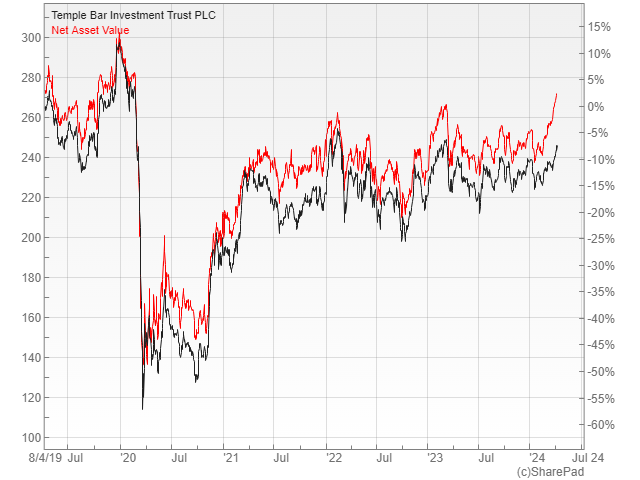The UK Investment Trust That Is Trading On Eight Times Earnings

There is a general consensus that the UK stock market is cheap, especially when compared to the US. This is particularly the case when you look at a value-oriented portfolio like Temple Bar (LON: TMPL) that is trading on just eight times historic earnings, versus the twenty times multiple of the S&P 500.
Obviously the earnings growth of the latter has far outstripped the former and may continue to do so, but it wouldn’t take much for the UK to generate a decent return. For example, if the Temple Bar portfolio was re-rated to a conservative ten times multiple it would imply a 25% gain.
Such a scenario would be entirely possible if inflation turns out to be sticky and interest rates have to stay higher for longer to keep it under control. A backdrop like this would tend to suit the sort of value opportunities the fund invests in and could depress the prices of the growth stocks that dominate indices like the S&P 500.
Solid Year
In its annual accounts to the end of December Temple Bar made an NAV total return of 12.3%, which was well ahead of the 7.9% achieved by the FTSE All-Share benchmark. Managers Ian Lance and Nick Purves have a well-defined strategy where they look for companies that are available at a discount to their intrinsic value.
They have a long-term approach and are not afraid to take high conviction bets on both individual stocks and sectors. This has resulted in a concentrated portfolio of around 30 positions, with the top ten accounting for about half of the assets.
At the end of February the largest sector allocations were Financials, Energy and Consumer Discretionary that made up 65% of the portfolio between them. The biggest individual positions included the likes of: Shell, BP, NatWest and TotalEnergies.
New Additions
Three new stocks were added last year with the first being Stellantis, which was formed by the merger of Fiat Chrysler and Peugeot in 2021. The managers think that the company is attractively valued at an historic P/E ratio of less than four times earnings, especially as it yielded about eight percent at the time of purchase.
The second addition was GlaxoSmithKline that was bought due to its world leading vaccines business, as well as operating profit growth expectations of more than 10% over the five years to 2026. Temple Bar’s other new holding was the insurer NN Group, which has a strong balance sheet, with a nine percent yield and a significant share buyback policy.
Since the end of the reporting period there have been takeover bids for two of the holdings − Currys and Direct Line − that the managers attribute to the “rock bottom” valuations in the UK at present. This has helped the trust to make a further 8.4% post year end.
Outlook
Dividends last year totalled 9.6p per share, an increase of 2.7% on 2022, which gives the trust an historic yield of 3.9%. It is currently trading at a 10% discount to NAV, despite an active program of share buybacks.
The managers think that the cheap valuations should be attractive to long-term investors, as stock market history has shown that low starting multiples are the best predictor of the future return. They note that even without a re-rating, investors can still be well rewarded through the dividends and value-enhancing buybacks.
Temple Bar is one of the few value funds to survive the long period in which growth managers dominated the performance tables. If inflation and higher interest rates are here to stay then it could benefit from a more supportive backdrop for some time to come.

Comments (0)